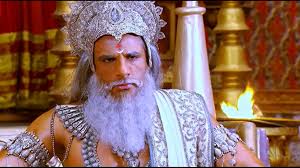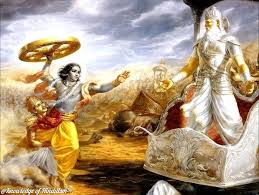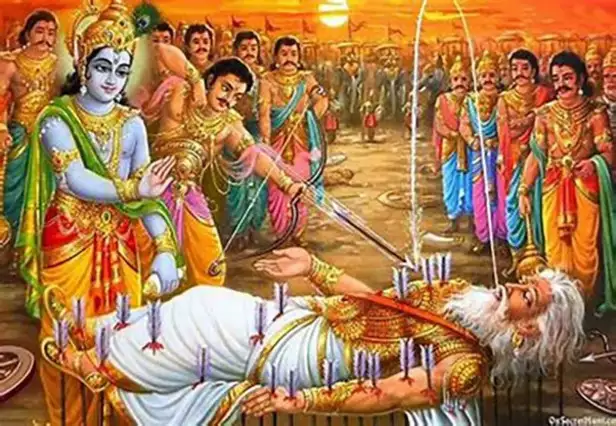When we think of unwavering commitment, sacrifice, and dharma, the name Bhishma immediately comes to mind. He was not just a warrior but the moral compass of the Kuru dynasty, standing as a pillar of strength, wisdom, and selflessness. His story is one of the most fascinating and complex in the Mahabharata, filled with choices that shaped the destiny of an entire kingdom.
Bhishma’s legacy goes beyond his battlefield prowess; he was a strategist, a guide, and an embodiment of devotion to duty. His terrible vow, his loyalty to Hastinapura, and his final teachings on the bed of arrows make him a timeless symbol of sacrifice. His life offers profound lessons on righteousness, leadership, and the consequences of unwavering loyalty.
Who Was Bhishma?
Bhishma was born as Devavrata, the son of King Shantanu and Goddess Ganga. His birth was marked by divine intervention and mystery. Ganga had drowned seven of her children before sparing Bhishma, following an agreement she had with Shantanu. The reason? These children were celestial beings cursed to be born as mortals, and drowning them was a way to release them from their earthly existence.
Raised in the royal palace of Hastinapura, Devavrata was trained in warfare, governance, and scriptures, excelling in all aspects. His wisdom and strength made him the most suitable heir to the throne. But fate had other plans.

The Great Vow – Why Did Bhishma Take the Terrible Oath?
King Shantanu fell in love with Satyavati, a fisherwoman, and wished to marry her. However, her father refused the marriage unless her children would inherit the throne. This put Shantanu in a dilemma, as Devavrata was already the rightful heir.
To fulfill his father’s desires, Devavrata renounced his claim to the throne. But he didn’t stop there. To ensure that no future descendant of his would challenge the throne, he took an unbreakable vow of lifelong celibacy. The heavens trembled at this resolve, and he was given the name Bhishma, meaning the one who took a ‘terrible vow.’
This oath defined Bhishma’s destiny, making him the most respected yet the most tragic figure in the Mahabharata.
Bhishma’s Role in Hastinapura – The Wise Protector
Though he had no claim to the throne, Bhishma became the protector and guardian of Hastinapura. He played a crucial role in shaping the destinies of Dhritarashtra, Pandu, and Vidura. His wisdom guided the Kuru dynasty through difficult times, and he was respected by all.
However, his unwavering loyalty to the throne also meant that he had to serve even when he disagreed with the rulers’ decisions. This created a deep moral dilemma for him, especially when Duryodhana’s unjust rule and arrogance threatened the kingdom. Should he remain loyal to his vow or intervene for the greater good?
Bhishma and Draupadi’s Humiliation – His Greatest Regret
One of the most heartbreaking moments in the Mahabharata was Draupadi’s humiliation in the Kuru court. As she was disrobed after the infamous dice game, Bhishma remained silent, bound by his loyalty to the throne.
Later, when Draupadi questioned him, Bhishma admitted his helplessness. He explained that dharma was complex and sometimes difficult to define. This moment remains a crucial lesson in understanding the limitations of blind loyalty.
Bhishma in the Kurukshetra War – The Unstoppable Force
As the eldest and most experienced warrior, Bhishma was appointed the commander-in-chief of the Kaurava army. Despite his affection for the Pandavas, he fought fiercely, bound by his duty to Hastinapura. He had vowed not to kill the Pandavas, yet he was unstoppable on the battlefield.
Arjuna, torn between his duty and love for his grand-uncle, hesitated to fight him. It was Krishna who intervened, urging Arjuna to do his duty. The moment came when Bhishma declared that he would not fight a woman. Seizing this opportunity, Krishna advised Arjuna to use Shikhandi, who was born a woman but identified as a man, as a shield. Bhishma lowered his weapons, allowing himself to be struck by arrows, bringing his undefeated streak to an end.

The Fall of Bhishma – The Bed of Arrows
Bhishma’s fall was not just a military defeat but a deeply symbolic moment. Lying on a bed of arrows, he demonstrated his boon of Iccha-Mrityu, choosing to remain alive until the auspicious time arrived for his departure.
During this period, he imparted Bhishma Neeti, a discourse on governance, duty, and morality, to Yudhishthira. His final teachings remain a valuable guide on leadership and righteousness.
The Spiritual Lessons from Bhishma’s Life
Bhishma’s life is filled with deep philosophical lessons:
- The fine line between duty and morality – While loyalty is important, one must also question when it becomes blind obedience.
- The burden of vows – Extreme vows can lead to suffering, showing the need for balance in dharma.
- Wisdom in leadership – His teachings on governance still hold relevance in today’s world.
Bhishma’s story teaches us that while duty is noble, flexibility and moral discernment are equally essential. He was not just a warrior but a philosopher, a leader, and an embodiment of sacrifice. His life was marked by unwavering devotion to duty, even at the cost of personal happiness. Yet, his dilemmas and regrets remind us that rigid principles can sometimes lead to suffering.
Even today, Bhishma’s legacy continues to inspire leaders, thinkers, and spiritual seekers. His wisdom on dharma, sacrifice, and righteousness provides invaluable lessons for navigating the complexities of life. Whether as a warrior or a sage, Bhishma remains one of the most profound characters in the Mahabharata, teaching us that true greatness lies not just in power but in wisdom and integrity.

